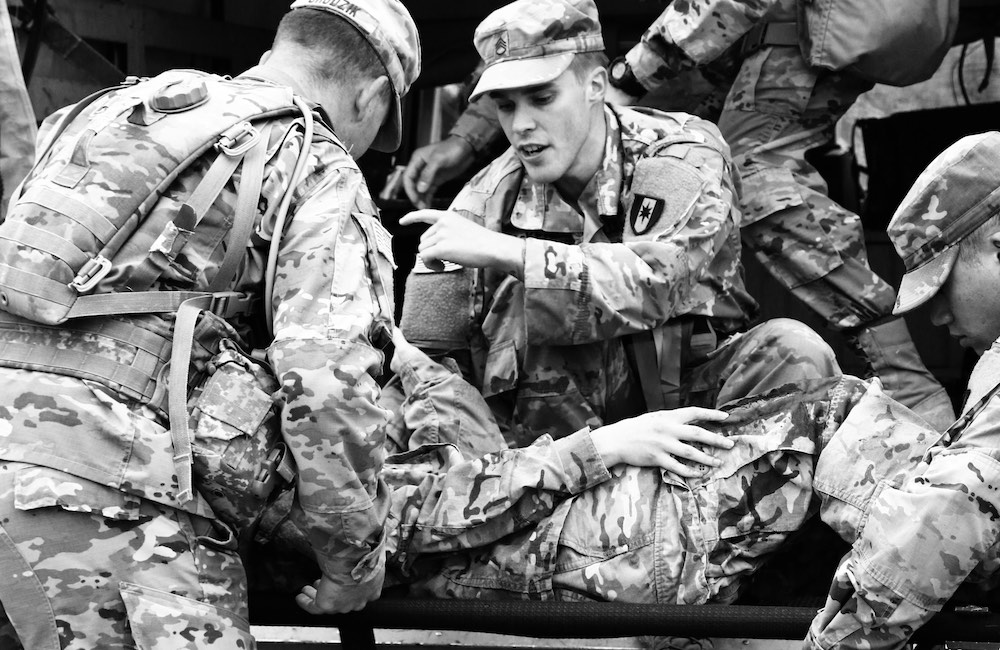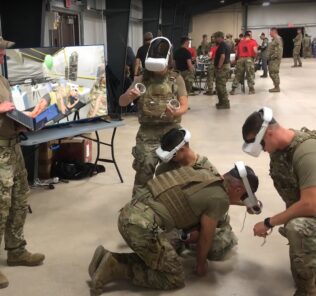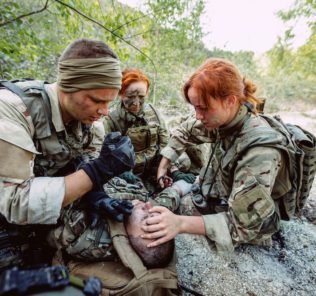Instructional Design Expert System (IDES): An Instructional Support System for Medical Simulation Instructors
Training to improve readiness is a key focus of the U.S Department of Defense (DoD), and this is particularly important for ensuring a high level of proficiency for military medical providers. The ongoing Joint Emergency Trauma Simulation (JETS) project is one of the current DoD initiatives to more effectively use clinical simulation to improve clinical proficiency. The core capability of the JETS project, currently under development by IVIR Inc., is to allow current, commercial off-the-shelf, medical simulations, and clinical simulation support systems to communicate with each other (in a federated network, over a standard Internet or intranet connection).
The JETS system allows multiple clinical simulation components to be combined to create a training microsystem representing a single, customized simulated patient. A component of JETS, the Instructional Design Expert System (IDES) will assist an instructor in creating a lesson plan for performance-based clinical training. This article shares more about the IDES, and the ways in which it can be used.
IDES USE Case: The training microsystem is a key aspect of JETS and can consist of multiple commercial simulators and part-task trainers, a physiology engine, an after-action review (AAR) system, and a learning management system (LMS) from different manufacturers. For example, JETS allows simulated patients to be digitally transferred to other patient simulators as an analog of the transfer of real-world patients through the various Military Health System’s Roles of Care. While this creates a powerful, integrated instructional delivery system, success is still dependent on the ability of individual instructors to deliver and manage the instruction.
Sponsored Content:
Military clinical instructors are often not experienced teachers before being assigned as instructors, as they are usually chosen based on their demonstrated clinical expertise. While some level of instructor training is often provided, the dynamic nature of military medicine today, particularly in terms of the clinical technology as well as the instructional technology, can create significant challenges for even an experienced clinical instructor.
What IDES aims to do is to provide an instructor with a computer-based expert system, that guides the instructor in transforming clinical practice guidelines into an integrated lesson plan and a performance assessment checklist. IDES natively integrates with JETS but can be used to support the planning, execution, and assessment of any clinical training.
The expert system is the first component of IDES. This will guide the instructor (or curriculum developer) in first creating the Instructional Goal (the task a learner is expected to perform in the real world under which conditions and to what standard) and the Terminal Learning Objective (TLO) which is the task (or observable behavior) the learner is expected to perform (under given conditions to a specific standard) after completing the instruction. IDES will then continue to guide the instructor in creating the Enabling Learning Objectives (ELO) that a learner has to master in order to achieve the TLO.
As each ELO is created, the instructor will be guided in determining its nature (Attitudinal, Cognitive, Psychomotor, or Verbal Information). This classification will then be used by the expert system to provide suggestions to the instructor on how best to present the learning material for that ELO. After completing this process, the expert system exports the results into the Lesson Plan and associated Performance Checklist. This completes most of the Lesson Plan, and what remains will be creating the administrative instructions for initializing and using the simulation(s) and simulation support devices as well as any relevant notes. When completed, the Lesson Plan and associated Performance Checklist will be stored.
Sponsored Content:
During the JETS simulation training, the Lesson Plan and Performance Assessment Checklist are located, as a tab, on the handheld tablet the instructor uses to control the JETS microsystem. During the delivery of instruction, the instructor can use the Performance Assessment Checklist as an aid in providing the learner formative performance feedback. If the instructor is using an AAR video recording system, the instructor can even bookmark key events, directly from the Performance Assessment Checklist, while observing the learner. Currently, IVIR’s web-based system, TrACER (TM), is used to manage the outputs from the lesson plan and performance assessment checklist
The ability to bookmark the AAR recording is also available during the formal, summative assessment of the learner, and in addition, the system will automatically recommend remediation to the learner for each failed ELO. By default, the results of each summative assessment will be stored in a database but will be exportable. Also by default, the Lesson and Performance Assessment Checklist will be permanently linked to each learner’s performance which IVIR believes will be useful in any future summative evaluation of the curriculum.
Note: IDES is being developed as part of the JETS project and a working prototype will be delivered to the U.S. Government, in March 2022.
More About IVIR Inc.
IVIR Inc. is a certified, Woman-Owned Small Business (WOSB) located in Sarasota, Florida. The company is dedicated to Innovative Research and Information Visualization with emphasis on training effectiveness, program management, system engineering, and community healthcare and education. IVIR encompasses the use of applied science and research in all aspects of improving the performance of people and their organizations. IVIR Inc.’s primary focus is medical modeling and simulation in military, civilian and foreign healthcare training markets.
More About the Author
William E. Lewandowski, MS — Lewandowski is currently Chair of the Board and Chief Operations Officer of IVIR Inc. He has over 32 years of experience in the design, development, implementation, and evaluation of simulation in the aviation, defense, and medical industries. He has 43 years of experience in all aspects of leadership, management, planning, and project management in the military, private and public sectors.
Lewandowski has published and presented in a number of international peer-reviewed venues on both simulation and instructional design and has served in an advisory capacity on these subjects to various U.S. and international clinical boards and societies. Lewandowski’s professional affiliations include the National Defense Industrial Association (NDIA), the Simulation Interoperability Standards Organization (SISO) and the Society for Simulation in Healthcare (SSH) on which he has served on the Board of Directors, as Chair of the Corporate Council, and he is currently a member of its Governance Committee.
Disclaimers and Acknowledgments: This effort is sponsored by the U.S. Government under Other Transactions Number W81XWH-15-9-0001. The U.S. Government is authorized to reproduce and distribute reprints for Governmental purposes notwithstanding any copyright notation shortly after that. The views and conclusions contained herein are those of the authors and should not be interpreted as necessarily representing the official policies or endorsements, either expressed or implied, of the U.S. Government.
Learn More About IVIR
Sponsored Content:

















